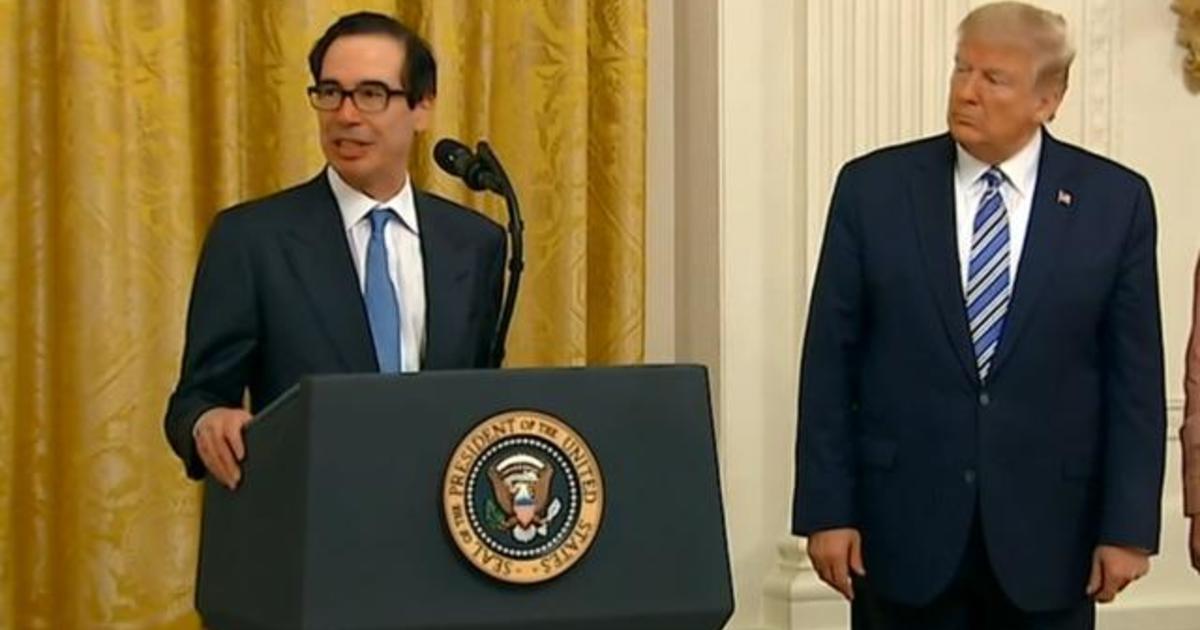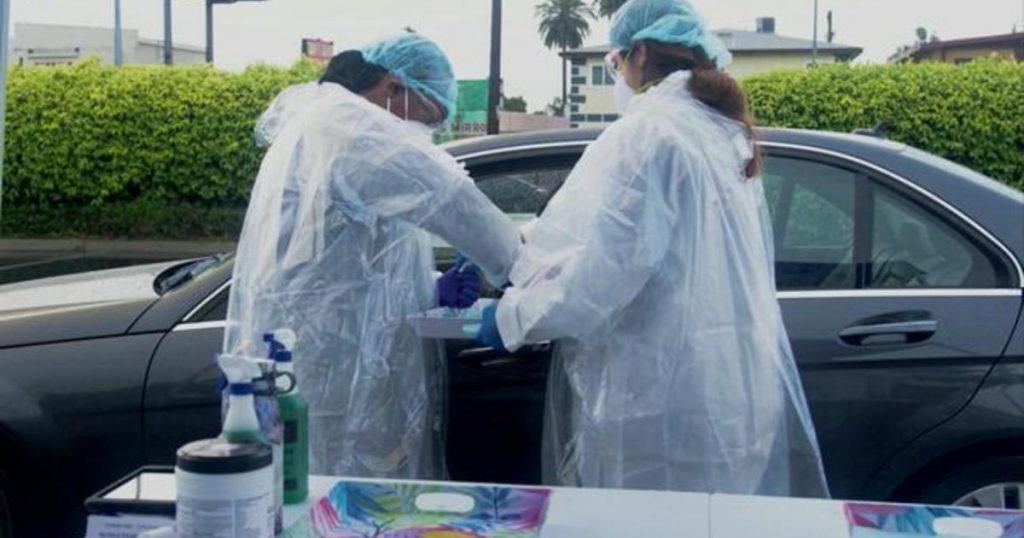
More than a dozen public companies that have borrowed millions from the U.S. government’s small business relief fund have recently raised or disclosed intentions to raise a total of more than $1 billion through stock offerings and debt deals, according to an analysis by CBS MoneyWatch.
The financing arrangements for the companies or their investors may contradict guidance issued nearly two weeks ago by the U.S. Treasury Department on what kinds of companies can participate in the Paycheck Protection Program. The PPP effort, run by the U.S. Small Business Administration, is meant to help employers get through the worst of the novel coronavirus pandemic with $660 billion in forgivable loans charging just 1% interest.
Companies must certify when they get a PPP loan that is is “necessary.” But the Treasury Department guidance, issued retroactively on April 23 after the first $350 billion in loans were depleted, states that if a company can raise money elsewhere — through stock market deals or debt offerings or private lenders, for example — then it isn’t likely “necessary” to borrow from the government program.
“If you recently raised tens of millions of dollars in a stock or debt offering, I think it’s going to be hard to certify that you really need the PPP loan,” said Christopher Austin, a partner at law firm Paul Hastings who has advised companies on whether they are eligible to borrow money through the program. Hastings declined to comment on any specific company or whether their planned stock or debt offerings would impact their eligibility for PPP money.
A workhorse
The largest PPP-recipient fundraising effort identified by CBS MoneyWatch is for Workhorse Group, a publicly traded company based in Loveland, Ohio, that employs 98 people at operations in Ohio and Indiana. Workhorse makes drones and electric delivery vehicles for shipping businesses whose customers include health-care companies. It got a $1.4 million PPP loan on April 14 as part of the first round of small business help, seven times the size of the average loan in the first round.
Workhorse last week started the process of raising as much as $250 million through a stock or debt offering, according to a filing with the U.S. Securities and Exchange Commission.
Shipping companies in many of the states hit hard during the coronavirus pandemic are viewed as essential businesses that can continue to operate. “In a time of crisis, drones could add safety, speed, predictability [and] efficiency to healthcare logistics,” the Workhorse website states.
Shares of Workhorse are up this year, including a 56% rise since it received its PPP loan, to $3.30 per share. The company’s current stock-market value is around $225 million.
Despite last week’s SEC filing, a spokesperson for Workhorse told CBS MoneyWatch the offering is in its early stages and the company did not know when — or even if— the offering would get done.
“In order to avoid options that may have a negative effect on both Workhorse and the local economy, which included possibly reducing pay, furloughing or terminating employees, Workhorse pursued the PPP loan made available to it by the government,” the spokesperson said. “The PPP loan has allowed Workhorse to maintain its employee base.”
Return to sender
Some public companies that got PPP loans have decided to return the funds amid public anger that smaller businesses have been shut out of the program by larger ones. For instance, the burger chain Shake Shack in April returned its $10 million PPP loan after raising $140 million in a stock offering the following week, noting that “many who need it most haven’t gotten any assistance.”
In all, according to a CBS News analysis of SEC filings as of last Friday, 25 public companies have opted to return more than $160 million in PPP loans, including Shake Shack, the Ruth’s Chris Steak House chain and the telecom IDT Corp.
The latest returnee is the hotel chain Ashford, which over the weekend said it and related entities that manage a total of 130 hotels would return $70 million already received in PPP funds.
The Treasury Department said in its updated guidance on April 23 that public companies with “substantial market value and access to capital markets” would be unlikely to qualify for the PPP program in “good faith.” The agency has since said it plans to audit loans over $2 million if the borrowers seek to have their low-interest loans forgiven.
The Treasury Department has given companies that received PPP loans until May 7 to return non-compliant loans. For example, if it turns out they didn’t qualify under the new guidelines because they had the ability to raise money from investors or lenders.
Financial health
Despite the Treasury Department’s warning shot, about 200 public companies have held on to the proceeds from their PPP loans. Of those, CBS MoneyWatch has identified 15 that have raised money through stock offerings or bond deals or have registered with the SEC to do so.
Like Workhorse, many of those offerings are in their early stages and may not be completed. But some have been completed. One of them is Senseonics Inc., which makes glucose monitoring devices for people with diabetes and employs 190 people.
On April 22, the Germantown, Maryland, company received a $5.8 million PPP loan. Within two days, Senseonics closed on a $15 million loan from a private lender, according to SEC filings. The loan agreement with the private lender also allows Senseonics to borrow another $5 million if it wants to do so.
The financial filing that discloses the loan says nothing specifically about using the new money to repay the government’s small business aid. Senseonics said it plans to use the private lender’s money for “general corporate purposes.” After securing the loan, Senseonics disclosed that CEO Timothy Goodnow, who was paid $2.2 million last year, is getting a 3% raise this year.
A spokesperson for Senseonics said the company has been negatively impacted by the unprecedented disruption across the health industry caused by the pandemic. The spokesperson said the company’s PPP loan has allowed it to retain its workers, as well as raise money from other sources at a crucial moment.
“At this very difficult time we consider both sources of capital important for our ongoing operations and to continue to support patients and employees,” the spokesperson said. “We believe the very difficult challenges our small company faces at this time, and the pressure on finances and employment, is the kind of difficult situation where these loans can be very helpful at bridging through this crisis.”
“Significant” other
Another public company that received PPP money is Phunware, a data-collection firm whose location-tracking clients include Donald Trump’s re-election campaign. Phunware, with around 55 employees following about 40 layoffs in March, got nearly $2.9 million from the PPP on April 10.
In late March, the company borrowed $2.4 million from a private lender through what’s known as a convertible bond deal. Phunware could also net an additional $3.4 million when the bonds it sold to its lender convert to stock.
Phunware CEO Alan Knitowski told CBS MoneyWatch the company intends to keep its $2.9 million loan and repay it in two years at 1% interest, as the PPP rules allow.
What’s more, Knitowski said, Phunware does not have “significant market value” — one of the Treasury Department’s potential disqualifiers for PPP loans — since its stock price of around 80 cents a share gives the entire company a stock-market value of about $30 million. He also said the terms of his company’s deal with the private lender in late March effectively blocks the company from raising any more money in the next 60 days.
“If you are able to do complicated securities transactions to raise money, that is not in the spirit of a program that was supposed to help small businesses,” said Kyle Herrig, the founder of Accountable.us, a non-profit financial watchdog that tracks government programs. “The optics of these transactions are not good.”
Additional reporting by CBS News’ Megan Towey.

